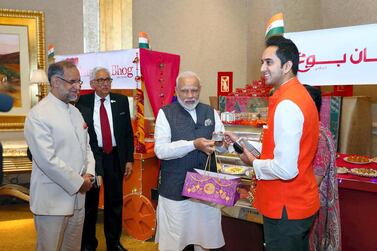The RuPay card was officially introduced in the UAE during Indian Prime Minister Narenda Modi's visit to the country on Saturday. Though residents have to wait a little longer before they can use RuPay, India's equivalent to Mastercard and Visa credit cards.
However, Indian residents or tourists holding RuPay Global cards can use them at UAE merchants that have upgraded their systems to accept RuPay.
The National explains how the card will work in the UAE.
What is RuPay?
Launched in 2012, RuPay is India's domestic debit and credit card payment network. It is widely accepted at automated teller machines, point-of-sale devices and e-commerce websites across India. It is also accepted in Singapore and will soon be available in the Maldives and Bhutan.
Currently, around 500 million active RuPay cards are in circulation in the Indian market. The country has a population of 1.3 billion people. Around 175,000 locations of 21 businesses and 5,000 ATMs in the UAE will start accepting the RuPay card, say officials.
Which banks will issue RuPay in the UAE?
India's state-owned Bank of Baroda will be the first to issue RuPay cards in the UAE. "To begin with, we will start issuing RuPay, along with our existing offering Visa, to our UAE customers. Once infrastructure is ready at the merchants' side, customers can decide which card they want to opt for, after experiencing the service and benefits," Ananda Kumar, general manager at Bank of Baroda for the Middle East, told The National.
UAE's First Abu Dhabi Bank and Emirates NBD will also issue RuPay. Banks are not yet to announce when UAE RuPay cards will be issued, officials say they are in the process of getting necessary approvals.
Is RuPay economical for merchants?
Industry experts say RuPay will charge 10 per cent of the transaction fees currently levied by global debit and credit card companies in the UAE.
“There will be a price advantage with RuPay … the transaction fees will be much less than Visa, so automatically they [merchants] will support it,” said Mr Kumar.
RuPay will also offer lower processing fees. "The Indian community is one of the biggest markets in the region and RuPay will bring many inherent advantages," Ulugbek Yuldashev, founder and chief executive of e-commerce company Awok in Dubai told The National.
“We have seen similar successful initiatives coming from China in the past and I think this is the time for India. Besides a huge expat population, many Indian tourists come to UAE … We will soon start accepting RuPay,” said Mr Yuldashev.
How will it help Indian tourists?
Almost a million Indian tourists visited the UAE in the first half of the year. The RuPay card will save tourists money on exchange rates, according to the Indian embassy in Abu Dhabi.
"Since the transaction processing will happen in India, it will lead to lower cost of clearing and settlement for each transaction … making the process quicker and economical. Tourists will also save big on exchange rate," Ali Hyder, group chief executive of Dubai software development company Focus Softnet told The National.







